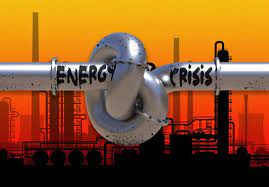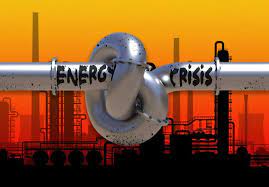
The German government has approved a series of wintertime energy-saving measures that will reduce the amount of lighting and heating used in public structures. Through the new regulations, the government hopes to reduce gas consumption by 2 per cent.
The rules, according to Germany's economy minister, could save private households, businesses, and the public sector about €10.8 billion over two years. It is a part of initiatives to lessen the nation's reliance on Russian gas.
Germany used to import 55% of its gas from Russia prior to Russia's invasion of Ukraine, but it has since cut this to 35% and vowed to completely stop imports.
Although it continues to be a sizable market for Moscow, it spent nearly $9.6 billion ($9.6 billion) on Russian oil and gas in the first two months of the conflict.
Additionally, Russia has reduced gas flows through the crucial Nordstream 1 pipeline to 20 per cent of its maximum capacity, raising concerns that it may turn off the taps this winter.
Germany wants to break free "as quickly as possible from the grip of Russian energy imports," Economy Minister Robert Habeck told reporters.
But he added: "Overall the [new] measures save energy. However, not to the extent that we can sit back and say, 'That'll do now.'"
Aside from institutions like hospitals, public buildings must be heated to a maximum of 19 degrees Celsius starting in September. The heating can be completely turned off in entranceways, hallways, and foyers. Additionally, for aesthetic reasons, public monuments and buildings won't be lit up, and businesses might be prohibited from keeping their stores lit up at night.
The heating of private swimming pools might also be prohibited. Additionally, the nation will prioritise shipping coal and oil over people on trains, so people will have to wait.
"We have a shortage situation on the rails right now," Transport Minister Volker Wissing said. "That means that if additional fuel transports are temporarily necessary we would have to prioritise them."
Germany also intends to launch public relations initiatives to educate locals about how to reduce their own consumption. Additionally, the nation is building two LNG terminals on the North Sea coast to increase storage amid worries about winter shortages.
The majority of the member states of the European Union have agreed to voluntarily cut their gas consumption by 15 per cent this winter, though this will become required if there are significant shortages. To save energy, Spain has already implemented regulations that restrict the use of air conditioning and heating in large commercial and public buildings.
The EU's plan would "certainly make sense," according to Switzerland's energy minister on Wednesday, if the nation wanted to avoid an energy crisis.
In case of blackouts brought on by changes in Russian supplies, the electricity commission of Switzerland has also advised households to stock up on candles.
Simonetta Sommaruga, the energy minister for Switzerland, stated earlier this month that she would work to have a plan to lower the heating in public buildings implemented.
(Source:www.theguardian.com)
The rules, according to Germany's economy minister, could save private households, businesses, and the public sector about €10.8 billion over two years. It is a part of initiatives to lessen the nation's reliance on Russian gas.
Germany used to import 55% of its gas from Russia prior to Russia's invasion of Ukraine, but it has since cut this to 35% and vowed to completely stop imports.
Although it continues to be a sizable market for Moscow, it spent nearly $9.6 billion ($9.6 billion) on Russian oil and gas in the first two months of the conflict.
Additionally, Russia has reduced gas flows through the crucial Nordstream 1 pipeline to 20 per cent of its maximum capacity, raising concerns that it may turn off the taps this winter.
Germany wants to break free "as quickly as possible from the grip of Russian energy imports," Economy Minister Robert Habeck told reporters.
But he added: "Overall the [new] measures save energy. However, not to the extent that we can sit back and say, 'That'll do now.'"
Aside from institutions like hospitals, public buildings must be heated to a maximum of 19 degrees Celsius starting in September. The heating can be completely turned off in entranceways, hallways, and foyers. Additionally, for aesthetic reasons, public monuments and buildings won't be lit up, and businesses might be prohibited from keeping their stores lit up at night.
The heating of private swimming pools might also be prohibited. Additionally, the nation will prioritise shipping coal and oil over people on trains, so people will have to wait.
"We have a shortage situation on the rails right now," Transport Minister Volker Wissing said. "That means that if additional fuel transports are temporarily necessary we would have to prioritise them."
Germany also intends to launch public relations initiatives to educate locals about how to reduce their own consumption. Additionally, the nation is building two LNG terminals on the North Sea coast to increase storage amid worries about winter shortages.
The majority of the member states of the European Union have agreed to voluntarily cut their gas consumption by 15 per cent this winter, though this will become required if there are significant shortages. To save energy, Spain has already implemented regulations that restrict the use of air conditioning and heating in large commercial and public buildings.
The EU's plan would "certainly make sense," according to Switzerland's energy minister on Wednesday, if the nation wanted to avoid an energy crisis.
In case of blackouts brought on by changes in Russian supplies, the electricity commission of Switzerland has also advised households to stock up on candles.
Simonetta Sommaruga, the energy minister for Switzerland, stated earlier this month that she would work to have a plan to lower the heating in public buildings implemented.
(Source:www.theguardian.com)














